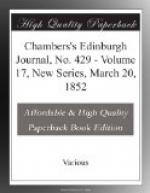The village of Montreaux was almost wholly inhabited by men, who made wrecking their profession. It was a collection of miserable huts, built principally out of the broken materials of the various vessels driven on shore; and ostensibly inhabited by fishermen, who, however, rarely resorted to the deep, except when a long continuance of fine weather rendered their usual avocation less prosperous than usual. They consisted in all of about thirty families, wreckers, for the most part, from father to son, and even from mother to daughter—for women joined freely in the atrocious trade. Atrocious indeed! for murder necessarily accompanied pillage, and it rarely happened that many of the crew and passengers of the unfortunate vessels escaped alive. Bodies were indeed found along the shore; but even if they exhibited the marks of blows, the sea and the rocks got the credit of the deed.
The interior of the huts of the hamlet presented a motley appearance. Their denizens were usually clothed in all kinds of costume—from the peculiar garments of Englishmen, to the turbans, shawls, and petticoats of Lascars, Malays, and others. Cases of spirits, chests of tools, barrels of flour, piles of hams, cheeses, curious arms, spy-glasses, compasses, &c. were thrust into coffers and corners; while all the villagers were in the habit of spending money that certainly was not coined in France. The state of the good people of Montreaux was one of splendid misery; for, with all their ill-gotten wealth, their improvidence and carelessness was such, that they often wanted necessaries—so true is it that ill-got money is never well-spent money. A month of fine weather would almost reduce them to starvation, forcing them to sell to disadvantage whatever they still possessed.
This was not, however, the case with every one of them. A man dwelt among them, and had done so for many years, who seemed a little wiser and more careful than the rest of the community. His name was Pierre Sandeau. He was not a native of the place; but had long been established among them, and had at once shewn himself a worthy brother. He was pitiless, selfish, and cold. Less fiery than his fellows, he had an amount of caution, which made them feel his value; and a ready wit, which often helped them out of difficulties. His influence was soon felt, and he became a kind of chief. He was at last recognised as the head of the village, and the leader in all marauding expeditions. But the great source of his power was his foresight. He had always either money or provisions at hand, and was always ready to help one of his companions—for a consideration. In times of distress, he bought up all the stock on hand, and even sold on credit. In course of time, he had become rich, had a better house than the rest, and could, if he liked, have retired from business. But he seemed chained to his trade, and never gave any sign of abandoning his disgraceful occupation.




